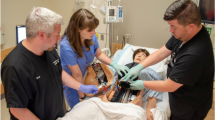Abstract
As the field of medical simulation grows, there is increasing demand for experts and leaders in the field. Simulation fellowships are one venue for intensive training and faculty development for a focused academic career. We describe here a model for such training, typically offered as a 1–2-year program of professional development. These formalized programs are designed to extend focused training beyond individual faculty development courses and continuing medical education programs, offering an advanced career pathway in the field. As more simulation fellowships and associated training opportunities are offered in the USA and abroad, a well-trained community of simulation leaders will increasingly be available to help guide and sustain the field.
Access this chapter
Tax calculation will be finalised at checkout
Purchases are for personal use only
Similar content being viewed by others
References
Gruppen L, Simpson D, Searle N, Robins L, Irby D, Mullan P. Educational fellowship programs: common themes and overarching issues. Acad Med. 2006;81:990–4.
Searle N, Hatem C, Perkowski L, Wilkerson L. Why invest in an educational fellowship program? Acad Med. 2006;81:936–40.
Hatem C, Lown B, Newman L. The Academic Health Center Coming of Age: helping faculty become better teachers and agents of educational change. Acad Med. 2006;81:941–4.
Gordon J, Oriol N, Cooper J. Bringing good teaching cases “to life”: a simulator-based medical education service. Acad Med. 2004;79:23–7.
Gordon JA. As accessible as a book on a library shelf: the imperative of routine simulation in modern healthcare. Chest. 2012;141(1):12–6.
Kern D, Thomas P, Howard D, Bass E. Curriculum Development for Medical Education: a six-step approach. Baltimore: The Johns Hopkins University Press; 1998.
Okuda Y, Bond W, Bonfante G, et al. National growth in simulation training within emergency medicine residency programs, 2003–2008. Acad Emerg Med. 2008;15:1113–6.
Fernandez R, Wang E, Vozenilek J, et al. Simulation Center Accreditation and Programmatic Benchmarks: a review for emergency medicine. Acad Emerg Med. 2010;17:1093–103.
Rudolph J, Simon R, Raemer D, Eppich W. Debriefing as formative assessment: closing performance gaps in medical education. Acad Emerg Med. 2008;15:1010–6.
Gordon J, Cooper J, Simon R, Raemer D. The Institute for Medical Simulation: a new resource for medical educators worldwide [abstract]. Anesthesiol Analg. 2005;101:S22.
Armstrong E, Doyle J, Bennett N. Transformative professional development of physicians as educators: assessment of a model. Acad Med. 2003;78:702–8.
Armstrong E, Barison S. Using an outcomes-logic-model approach to evaluate a faculty development program for medical educators. Acad Med. 2006;81:483–8.
Author information
Authors and Affiliations
Corresponding author
Editor information
Editors and Affiliations
Rights and permissions
Copyright information
© 2013 Springer Science+Business Media New York
About this chapter
Cite this chapter
Hayden, E.M., Gordon, J.A. (2013). Fellowship Training in Simulation. In: Levine, A.I., DeMaria, S., Schwartz, A.D., Sim, A.J. (eds) The Comprehensive Textbook of Healthcare Simulation. Springer, New York, NY. https://doi.org/10.1007/978-1-4614-5993-4_42
Download citation
DOI: https://doi.org/10.1007/978-1-4614-5993-4_42
Published:
Publisher Name: Springer, New York, NY
Print ISBN: 978-1-4614-5992-7
Online ISBN: 978-1-4614-5993-4
eBook Packages: MedicineMedicine (R0)




